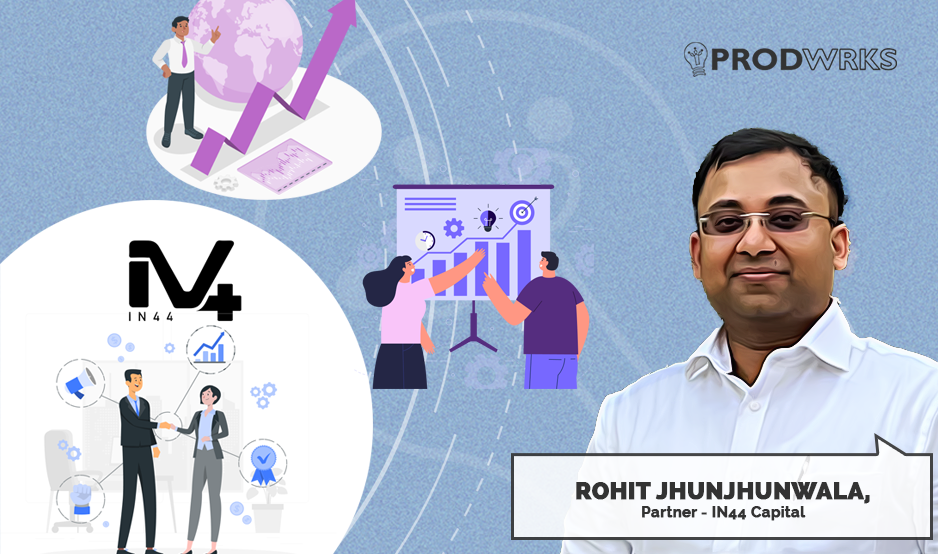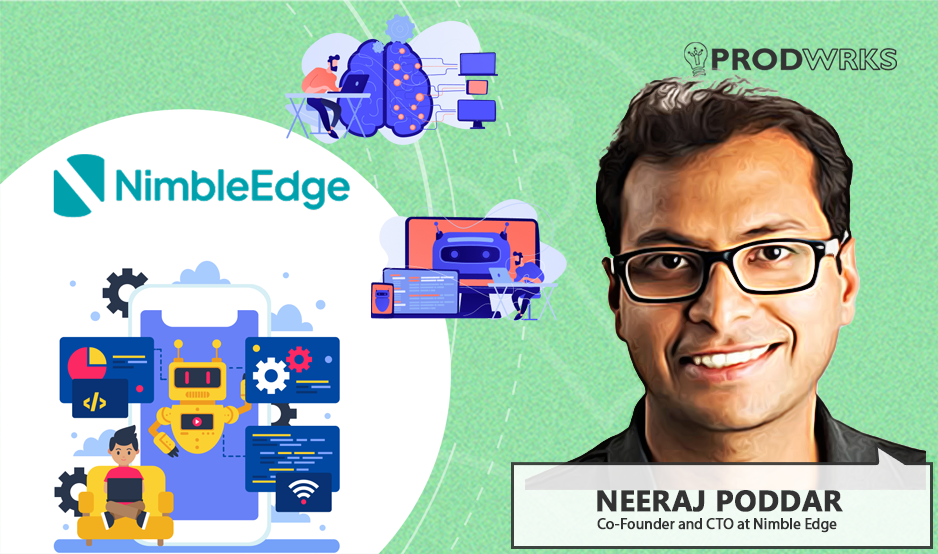
In India, early-stage investing has quietly evolved over the past decade. What began as an opaque world of HNI-driven bets is becoming more structured, data-driven, and professional. The ecosystem is still nascent compared to the U.S., but the surge of interest is real. In 2024, early-stage startups emerged as the darling of Indian investors, with 40 early-stage funds launched worth over $1.94 billion, accounting for half of all new funds raised in India that year.
Chennai-based IN44 Capital, a venture capital firm founded by Rohit Jhunjhunwala, Sathish Ganesan, and Rajesh Chhaochharia, is part of this growing wave. Launched in 2024, IN44 Capital focuses on backing startups in the Tech B2B space.
We spoke to Rohit Jhunjhunwala, co-founder and partner at IN44 Capital, to understand the intricacies of the venture capital world and early-stage investments in India. He shares his journey, IN44 Capital’s investment thesis, and how the firm gets involved early in a startup’s journey and supports it through the initial stages of growth.
The Roots of IN44 Capital
Rohit Jhunjhunwala’s journey began not in venture capital, but inside his family’s NBFC, where he managed lending operations for mid-sized corporates. With a background in software engineering and a finance-focused MBA, he brought structure to operations and evaluated hundreds of businesses, including startups.
It was in this process that he stumbled into startup investing. He first began to think of startups as a class of asset diversification, leading him to Keiretsu Forum, an angel network with a chapter in Chennai, where investing came with structure.
Rohit explains, "That’s where I first got exposure to the formal process of evaluating a startup, understanding the paperwork involved, and knowing what kind of questions to ask at the early stage. That’s also where we made our initial bets. My portfolio started to take shape from Keiretsu onwards."
"I found that it brought together both technology and finance, which were the two areas I had worked in. Coming from a background in computer science and finance, it felt like a natural fit. I also realized that I genuinely enjoyed the evaluation process, the paperwork, and the day-to-day work that came with it."
IN44 Capital’s Investment Sweet Spot: Where the tech is built and traction has just begun
“Between MVP and early traction is what we define as early stage, and anything beyond that is not in the scope. If you're still figuring out the tech or haven’t launched, you’re too early for us,” Rohit says. “And if you’ve already scaled beyond that first traction, you’re outside our scope.”
Additionally, IN44 Capital invests only in B2B companies. Startups that are B2C or even B2B2C are passed on without further discussion, and these boundaries are enforced tightly, partly to maintain consistency with the firm’s thesis.
Rohit explains, “Any company that is B2C or even B2B2C is automatically filtered out. “If it doesn’t fit the thesis, we don’t take it forward.”
"Often, you are betting on the future of the company rather than what it is today. We do not have a lot of data to go on. It is about believing in the potential, not just the present."
IN44 Capital’s Approach to Investing in New Wave “AI Startups”
For IN44 Capital, the emergence of AI is viewed as another wave of technological change, one that, like past shifts, is forcing businesses to re-evaluate how they operate. Rohit draws a parallel with earlier disruptions such as the Industrial Revolution or the arrival of smartphones, pointing out that each shift required companies to adjust to a new equilibrium.
But at IN44 Capital, the focus remains steady: whether AI can help a business solve a meaningful, real-world problem.
“Business does not need technology to exist. People have run businesses for centuries without it,” Rohit says. “But technology helps improve efficiency and scale. AI is no different. A business can function without technology, but technology cannot function as a business on its own. Just having the tech is not enough. It needs to solve a real problem or create real value.”
“Even if a business doesn’t adopt AI right away, it still needs to understand how AI is going to impact its space,” he says. For IN44 Capital, that understanding, more than the buzz, is what matters.
Reading the Market in a Post-Funding Winter World
“There was never a lack of startups,” he says, “India registers tens of thousands of new startups every year. The question isn’t whether they exist, it’s whether they fit the thesis you're investing in.”
“You might see waves of different types of companies depending on the year,” he says. “Sometimes B2B dominates, other times you will see a bunch of companies in a specific sector coming out of the same accelerator or cohort.”
According to Rohit, these surges can give the impression that quality is fluctuating, but it is really just a reflection of what happens to be visible to investors at that moment.
To him, the real meaning of a funding winter lies in the misalignment between founders’ expectations and investors’ willingness to pay.
“It’s not that the money isn’t there. It’s just that founders may not get the valuations they want. That’s what drives down-rounds and flat-rounds. VCs are often fine with that they end up owning more. But for founders, it’s painful.”
Coachability, Resilience, Vision: IN44 Capital’s Criteria for Early-Stage Founders
“A good business is defined by the quality of its founders,” Rohit explains. “At this stage, the founder and the company are essentially the same. So we are looking at who they are, what team they are building, and whether that team is capable of executing the vision.”
“We look at whether they’re open to learning from others. We’ve seen more, we’ve been around longer. Will they take advice? Will they adapt? Is something we also look for?”
IN44 Capital also has a keen eye on the startup’s resilience, where the startup must be able to survive without immediate dependence on external capital. The firm looks for companies that, even if they are not growing rapidly, have the fundamentals to stay afloat during lean funding periods. It is not just about whether a company can scale but whether it can sustain itself until the right kind of capital comes in.
Rohit explains that the best founders are those who build this kind of durability into the way they run their businesses
"We want to back teams that use capital to accelerate growth, not just to stay alive. If funding slows down, the business should still be able to function. That kind of resilience tells us the model is solid and the team knows what they are doing."
The Firm’s Edge: Finding White Spaces Before They Go Mainstream
Instead of chasing trends, IN44 Capital focuses on identifying white spaces, which are underexplored problem areas where existing businesses have not yet found effective solutions.
One of the most interesting spaces IN44 Capital is watching closely is data monetization, where startups can take any kind of dataset, be it internal, public, or generated, and build a business around its use. Rohit explains that the data in itself isn’t the primary business, but how a business gets business around the data. As more of the world gets digitized, IN44 Capital expects this layer of value creation to become foundational.
The second sector IN44 Capital is betting on is the manufacturing opportunity, as Rohit sees it, lies in upgrading setups without disruption.
“India is a very price-conscious market,” he says. “And manufacturing spans everything from ultra-small to ultra-large scale. If you can create tools that plug into this spectrum without requiring an overhaul, there’s huge potential.”
“Every sector has white spaces,” he says. “We’re not looking for the next hot market. We’re looking for the next clear gap.”
How IN44 Capital Compares Indian Founders to Their Global Counterparts
Through IN44 Capital’s work with early-stage companies, a clear pattern has emerged in how product founders from India differ from those in markets like the US or Europe, often coming down to vision. IN44 Capital has observed that Indian founders typically start companies based on personal experiences, where the problems they tackle are ones they’ve encountered firsthand or seen closely. Although it makes conviction strong, the scope becomes narrower.
As Rohit puts it, many Indian founders will say, “I had this problem, I spoke to ten others, and I realized this is a business.” But ten users don’t make a market. IN44 Capital looks for founders who go further, who ask whether the problem applies at the scale of tens of thousands, not just a small peer group.
This is where founders in the US often differ. Their approach starts with the size of the problem. They may not come from the industry they’re targeting, but they identify gaps at a global level and build with scale in mind. In the US, it’s also more common to raise funding purely on the strength of that vision. In India, that’s harder while the ecosystem is still evolving, and the appetite for early-stage risk is limited.
At the same time, IN44 Capital believes Indian founders are among the best in the world when it comes to product execution. Many global startups continue to build from India or bring product work back here because the technical depth is strong.
"I have seen a lot of people come back from the US to build world-class products in India, and others who raise funds abroad but still choose to build here. Indians can build great products. The real question is whether you are willing to bet on an Indian product and an Indian founder."
The Problem With India’s Siloed Startup Ecosystem
Rohit explains, “This regional compartmentalization has created narrow pipelines for talent, capital, and mentorship. Founders and investors often remain within familiar geographies, which limits the flow of knowledge and reduces their exposure to broader opportunities.”
For the ecosystem to truly evolve, Rohit believes that this mindset has to shift. “You shouldn’t need to be in a specific city to access the right infrastructure or raise the right round,” he says. The future, as IN44 Capital sees it, lies in a more integrated, pan-India network, one where talent and opportunity are accessible no matter where a founder starts.
The firm believes the ecosystem needs to function more cohesively. Founders should be able to raise from investors across the country, not just those in their city. Similarly, investors need to look beyond familiar geographies and back promising companies wherever they are based.
Rohit points to a persistent perception gap in India’s angel investing landscape. It is still often seen as a space reserved for the wealthy or well-connected, accessible only to those with significant capital or insider networks. IN44 Capital is working to challenge that view. The firm positions angel investing as a legitimate asset class, high risk but also high potential, open to anyone who believes in backing early-stage founders and participating in India’s long-term growth story.
Down the lane, Rohit wants In44 Capital to be seen as a reference check in early-stage B2B investing in India. The idea is simple: if a B2B startup is raising, IN44 Capital should be one of the firms people expect to have looked at the deal, even if they didn’t invest.
The firm sees its role not just as a capital provider, but as a participant in reshaping how the Indian startup ecosystem grows: more open, more distributed, and more inclusive.



